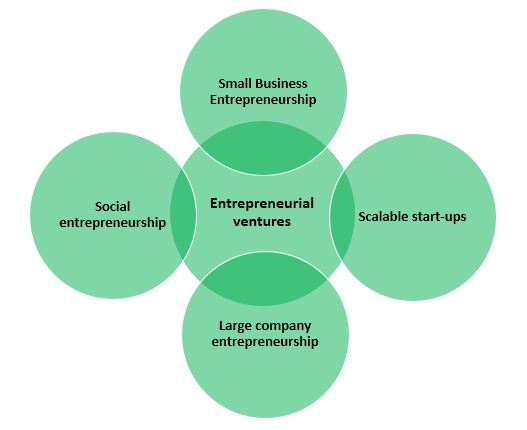Introduction
All entrepreneurial ventures are not same in nature; these are widely different. The most prominent similarity among all the types of entrepreneurship is that it is established to make profits (Bruton, Ahlstrom and Puky, 2009). Another common objective of all these forms of the venture is that they are all established with a similar process of planning, managing, and organizing the venture. This article presents the differences among entrepreneurial ventures.
Presenting the differences among entrepreneurial ventures

Differences in Terms of Scale:
The scale of entrepreneurial ventures varies significantly across different types. Small businesses and lifestyle businesses usually operate on a smaller scale, often catering to local or niche markets with limited growth potential. On the other hand, high-growth startups and franchise businesses are designed for rapid expansion and growth, potentially on a national or international level. Social enterprises, online businesses, and non-profit businesses can range in scale, depending on the scope of their objectives and resources. Corporate entrepreneurship often occurs within large organizations, leveraging their existing infrastructure and resources for growth.
Differences in Terms of Risk:
Another scope of analyzing the differences among different entrepreneurial ventures is the risks different ventures can accept. Small and lifestyle businesses generally involve lower risks, as they have smaller investments and are often self-funded. Secondly, high-growth startups and online businesses face higher risks due to their reliance on external funding and the competitive nature of the industries. Thirdly, franchise businesses carry moderate risks as they follow an established business model while backing an existing organization typically mitigates corporate entrepreneurship risks. Finally, social enterprises and non-profit businesses face risks related to their mission, funding, and operational viability.
You may also be interested in: Impact of small businesses on the UK economy Importance of small businesses for social economy Traits and skills of successful entrepreneurs How background foster or hinder entrepreneurship
Differences in Terms of Revenue Model:
The revenue models for different entrepreneurial ventures also vary significantly. Small and lifestyle businesses often generate revenues through either traditional sales methods or online platforms, such as e-commerce stores or digital marketplaces. High-growth startups usually rely on venture capital and angel investors for funding while leveraging emerging markets or technologies to generate revenue. Franchise businesses often generate revenues through fees collected from franchisees and product sales and services rendered. Corporate entrepreneurship typically generates additional value from existing resources, such as spinoffs, mergers and acquisitions, or internal product development. Social and non-profit enterprises typically rely on donations and grants to generate revenue while adhering to their mission.
Differences in Terms of Location:
Location can also have a significant impact on the type of entrepreneurial venture. Small businesses, lifestyle businesses, and franchises are often tied to specific physical locations, serving local or regional markets. Online businesses and high-growth startups can operate virtually, providing products or services globally. Social enterprises, non-profit businesses, and corporate entrepreneurship initiatives can vary regarding location requirements, depending on their mission and objectives.
Differences in Terms of Target Market:
The target market for each type of entrepreneurial venture also varies significantly. Small and lifestyle businesses usually target local or niche markets, while high-growth startups often aim for broader markets or specific industries. In contrast, online businesses can target global or specialized markets, depending on their focus. Thirdly, franchise businesses follow the target market of the franchisor’s established brand. Finally, social enterprises and non-profit businesses have target markets based on their mission and beneficiaries, while corporate entrepreneurship projects target markets within or adjacent to their parent company’s industry.
Differences in Terms of Resources Required:
The resources needed to establish and run different entrepreneurial ventures also differ significantly. Small, lifestyle and non-profit businesses often require fewer resources, relying on bootstrapping or small investments. On the other hand, high-growth startups, online businesses, and franchise businesses may need significant capital and resources to scale and expand. Social enterprises require resources to balance their social objectives with financial sustainability. Finally, corporate entrepreneurship initiatives leverage the parent company’s resources to develop new projects.
Differences in Terms of Length of Time to Achievable Profitability:
Small businesses and lifestyle businesses may achieve profitability relatively quickly, depending on the market and competition. In contrast, high-growth startups and online businesses may take longer to reach profitability as they focus on rapid growth and market share. Franchise businesses can achieve profitability faster, given the established business model. Social enterprises, non-profit businesses, and corporate entrepreneurship projects have varying profitability timelines, depending on their objectives and industry dynamics.
Differences in Terms of Regulation Requirements or Complexity:
Small, lifestyle and online businesses generally face less regulatory complexity than high-growth startups, which may have more stringent requirements due to funding and expansion plans. Franchise businesses must adhere to franchisor regulations and guidelines. Social enterprises, non-profit businesses, and corporate entrepreneurship initiatives may face additional regulatory requirements depending on their mission, objectives, and industry.

[…] might also be interested in: Differences among entrepreneurial ventures Know the types of entrepreneurial […]
[…] may also be interested in: Why Nokia Failed Marketing strategies of Uber Differences among entrepreneurial ventures Impact of small businesses on the UK economy Importance of small businesses for social economy […]
[…] may also be interested in: Differences among entrepreneurial ventures Impact of small businesses on the UK economy Traits and skills of successful entrepreneurs How […]
[…] Differences among entrepreneurial ventures […]
[…] may also be interested in: Differences among entrepreneurial ventures Impact of small businesses on the UK economy Importance of small businesses for social economy […]